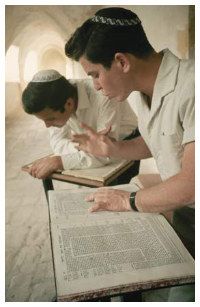Post by Leon on Apr 27, 2012 0:58:42 GMT

This is a brief introduction to the Talmud, what follows is some wisdom from the great book.
The Talmud (Hebrew: תַּלְמוּד talmūd "instruction, learning", from a root lmd "teach, study") is a central text of mainstream Judaism. It takes the form of a record of rabbinic discussions pertaining to Jewish law, ethics, philosophy, customs and history.
The Talmud has two components: the Mishnah (Hebrew: משנה)(c. 200 CE), the first written compendium of Judaism's Oral Law; and the Gemara (c. 500 CE), an elucidation of the Mishnah and related Tannaitic writings that often ventures onto other subjects and expounds broadly on the Hebrew Bible.
The terms Talmud and Gemara are often used interchangeably. The Gemara is the basis for all codes of rabbinic law and is much quoted in other rabbinic literature. The whole Talmud is also traditionally referred to as Shas (ש״ס), a Hebrew abbreviation of shisha sedarim, the "six orders" of the Mishnah.
Originally, Jewish scholarship was oral. Rabbis expounded and debated the law (the written law expressed in the Hebrew Bible) and discussed the Tanakh without the benefit of written works (other than the Biblical books themselves), though some may have made private notes (megillot setarim), for example of court decisions. This situation changed drastically with the introduction of the Talmud.
The Talmud has two components: the Mishnah (Hebrew: משנה)(c. 200 CE), the first written compendium of Judaism's Oral Law; and the Gemara (c. 500 CE), an elucidation of the Mishnah and related Tannaitic writings that often ventures onto other subjects and expounds broadly on the Hebrew Bible.
The terms Talmud and Gemara are often used interchangeably. The Gemara is the basis for all codes of rabbinic law and is much quoted in other rabbinic literature. The whole Talmud is also traditionally referred to as Shas (ש״ס), a Hebrew abbreviation of shisha sedarim, the "six orders" of the Mishnah.
Originally, Jewish scholarship was oral. Rabbis expounded and debated the law (the written law expressed in the Hebrew Bible) and discussed the Tanakh without the benefit of written works (other than the Biblical books themselves), though some may have made private notes (megillot setarim), for example of court decisions. This situation changed drastically with the introduction of the Talmud.
- The highest form of wisdom is kindness.
- You can educate a fool, but you cannot make him think.
- If silence be good for the wise, how much better for fools.
- When you teach your son, you teach your son's son.
- Sin is sweet in the beginning, but bitter in the end.
- Join the company of lions rather than assume the lead among foxes.
- The Divine Spirit does not reside in any except the joyful heart.
- More people die from over-eating than from undernourishment.
- For the unlearned, old age is winter; for the learned it is the season of the harvest.
- Who is a wise man? He who learns of all men.
- A dream which is not interpreted is like a letter which is not read.
- Loving kindness is greater than laws; and the charities of life are more than all ceremonies.
- The parent who does not teach the child a useful trade is teaching him or her to steal.
- There is no pity for a man who moans about living in one town and does not move to another.



